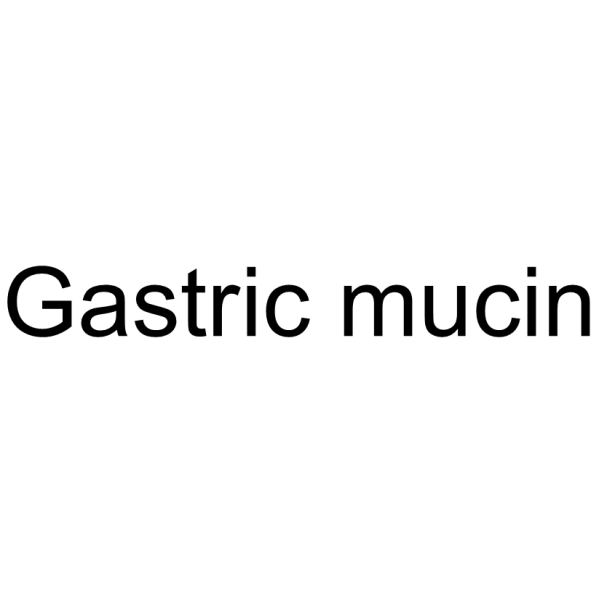All AbMole products are for research use only, cannot be used for human consumption.

Gastric mucin is a large glycoprotein which is thought to play a major role in the protection of the gastrointestinal tract from acid, proteases, pathogenic microorganisms, and mechanical trauma. In Vitro: Gastric mucin may be integrally involved in the mechanism of gastric mucosal injury caused by Helicobacter pylori leading to gastritis, peptic ulceration, and possibly gastric cancer[1]. Gastric mucins are classified into two types based on their histochemical properties. The first is a surface mucous cell-type mucin, secreted from the surface mucous cells. The second is found in deeper portions of the mucosa and is secreted by gland mucous cells, including mucous neck cells, cardiac gland cells, and pyloric gland cells. The unique O-glycans in gastric mucin appears to function as a natural antibiotic, protecting the host from H. pylori infection[2]. Gastric mucin may provide protection to the surface epithelium gastrointestinal tract by scavenging oxidants produced within the lumen; however, it does so at the expense of its viscoelastic properties. Both native and pronase-treated mucin effectively scavenge hydroxyl radical and that the scavenging properties are not significantly different. The effective concentration of mucin required for a 50% reduction in malondialdehyde production is 10 mg/mL for both native and pronase-treated mucin[3].
| CAS Number | 84082-64-4 |
| Solubility (25°C) | 1 M NaOH: soluble 20 mg/mL |
| Storage |
Powder -20°C 3 years ; 4°C 2 years In solvent -80°C 6 months ; -20°C 1 month |
[4] No authors listed. Br Med J. Gastric mucin
[5] D Waldron-Edward. Can J Surg. Gastric mucin and mucinous secretions
| Related Antibiotic Products |
|---|
| Puromycin-d3
Puromycin-d3 is the deuterium labeled Puromycin. Puromycin dihydrochloride is the dihydrochloride salt of puromycin. Puromycin is an aminoglycoside antibiotic that inhibits protein synthesis. |
| BSH-IN-1
BSH-IN-1 is a potent and covalent inhibitor of gut bacterial recombinant bile salt hydrolases (BSHs) with IC50s of 108 nM and 427 nM for B. longum BSH (Gram positive) and B. theta BSH (Gram negative), respectively. |
| AAA-10
AAA-10 is an orally active gut bacterial bile salt hydrolases (BSH) inhibitor, with IC50s of 10 nM, 80 nM against B. theta rBSH and B. longum rBSH respectively. |
| Gut restricted-7
Gut restricted-7 (GR-7) is a potent, covalent and orally active pan-bile salt hydrolase (BSH) inhibitor. Gut restricted-7 has a tissue-selective and is restricted to the gut. Gut restricted-7 decreases gut bacterial BSHs and decreases deconjugated bile acid levels in feces of mice. |
| N-Hydroxypipecolic acid
N-Hydroxypipecolic acid (1-Hydroxy-2-piperidinecarboxylic acid), a plant metabolite and a systemic acquired resistance (SAR) regulator, orchestrates SAR establishment in concert with the immune signal salicylic acid. N-Hydroxypipecolic acid accumulates systemically in the plant foliage in response to pathogen attack. N-Hydroxypipecolic acid induces SAR to bacterial and oomycete infection. |
All AbMole products are for research use only, cannot be used for human consumption or veterinary use. We do not provide products or services to individuals. Please comply with the intended use and do not use AbMole products for any other purpose.


Products are for research use only. Not for human use. We do not sell to patients.
© Copyright 2010-2024 AbMole BioScience. All Rights Reserved.
